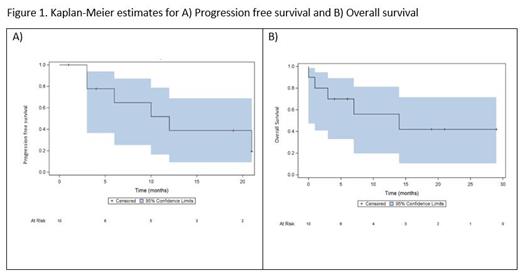Background: Primary central nervous system lymphoma (PCNSL) and secondary central nervous system lymphoma (SCNSL) each carry a poor prognosis. About 50% of patients with PCNSL will have refractory or relapsed disease correlating with dismal survival. SCNSL is associated with median overall survival (OS) of <6 months. (El-Galaly et al . Eur. J. Cancer 2018) Lenalidomide and ibrutinib each have single agent activity in PCNSL and SCNSL, albeit with limited duration of response (DOR). In combination, they have synergistic activity through modulation of NF-kappa B pathway. The regimen rituximab, lenalidomide, and ibrutinib (R2I) has demonstrated complete and durable responses in a subset of patients with good tolerability. (Houllier et al . Neurology 2021). We report our institutional outcomes with this regimen and its potential role as a bridge to autologous stem cell transplantation (ASCT) or CD19-targeted CAR T-cell therapy.
Methods: This retrospective study included ten large B-cell lymphoma (LBCL) patients with PCNSL or SCNSL who received R2I regimen at Miami Cancer Institute from December 2020 to March 2023. Treatment response was assessed using International PCNSL Collaborative Group's criteria. (Abrey et al. J Clin Oncol 2005) Efficacy was evaluated from the start of R2I regimen. Progression free survival (PFS) and overall survival (OS) were estimated using the Kaplan-Meier method.
Results: The median age at R2I initiation was 71 (range, 57-85) years. Six of 10 (60%) patients were ≥65 years. Five of 10 (50%) patients had PCNSL. The median number of prior lines of therapy was 2 (range, 1-7). None of the patients had prior ASCT. The median number of cycles of R2I was 4 (range, 1-23). Four patients received a higher dose of rituximab (500mg/m 2). Overall response rates (ORR) and complete response (CR) rates were 80% (95% CI, 55.2 to 100) and 40% (95% CI, 9.6 to 70.3), respectively. The median time to best response was 1.5 (range, 1.0-13.0) months and the median DOR was 5.5 (range, 2.5-18.0) months. The 1-year PFS and OS were 38.8% (95% CI: 4.9 to 72.8) and 56% (95% CI: 22.5 to 89.4), respectively (Figure 1). In the PCNSL subgroup, the 1-year OS was 80% (95% CI, 44.9 to 100) and PFS was 60% (95% CI, 17 to 100). No differences in response rates to R2I between PCNSL and SCNSL were observed (p=0.9).
There were no deaths or treatment discontinuations due to R2I toxicity. Two patients on R2I underwent subsequent cellular therapy. One PCNSL patient in CR received carmustine (BCNU) and thiotepa conditioning followed by autograft rescue and remains in remission 16 months post-ASCT. The second patient received CD19-targeted CAR T-cell therapy with axicabtagene ciloleucel for SCNSL. The patient expired 119 days after CAR T-cell therapy due to systemic disease relapse. Another patient, initially deemed ineligible for any cellular therapy due to poor performance status, has achieved a durable response with improvement of performance status and is currently awaiting ASCT.
Conclusion: R2I is an effective and safe regimen in patients with PCNSL and SCNSL. Although responses without consolidation may be durable, R2I should be considered as an active drug combination and well-tolerated bridge to cellular therapy to achieve long term survival.
OffLabel Disclosure:
Perez Perez:Gilead Kite: Speakers Bureau. Nahas:Janssen: Speakers Bureau; BMS: Other, Speakers Bureau. Odia:GammaTile, Istari Oncology, PharPoint Research: Consultancy; Bristol Myers Squibb (Inst), Novocure (Inst): Research Funding. Ahluwalia:MimiVax: Current holder of stock options in a privately-held company; Doctible: Current holder of stock options in a privately-held company; CytoDyn: Current holder of stock options in a privately-held company; MedInnovate Advisors LLC: Current holder of stock options in a privately-held company; Bayer, Celularity, InSightec, Novocure, Nuvation Bio, Apollomics, KIYATEC, GlaxoSmithKline, Prelude Therapeutics, Janssen, ViewRay, Xoft, SDP Oncology, Voyager Therapeutics, Pyramid Biosciences, Caris Life Sciences, Anheart Therapeutics, Theraguix, Varian: Consultancy; Novartis (Inst), Novocure (Inst), AstraZeneca (Inst), Merck (Inst), Pharmacyclics (Inst), Incyte (Inst), Bayer (Inst), Bristol Myers Squibb (Inst), Boston Biomedical (Inst), MimiVax (Inst), AbbVie (Inst): Research Funding. Linhares:AstraZeneca: Membership on an entity's Board of Directors or advisory committees; Alexion: Membership on an entity's Board of Directors or advisory committees; AbbVie: Membership on an entity's Board of Directors or advisory committees; BeiGene: Membership on an entity's Board of Directors or advisory committees, Research Funding; ADC Therapeutics: Membership on an entity's Board of Directors or advisory committees; Celgene: Membership on an entity's Board of Directors or advisory committees; Genentech: Membership on an entity's Board of Directors or advisory committees; GSK: Membership on an entity's Board of Directors or advisory committees; Incyte: Membership on an entity's Board of Directors or advisory committees; Janssen: Membership on an entity's Board of Directors or advisory committees; Kyowa: Membership on an entity's Board of Directors or advisory committees; Novartis: Membership on an entity's Board of Directors or advisory committees; Seagen Inc.: Membership on an entity's Board of Directors or advisory committees, Research Funding; Kyowa Kirin: Speakers Bureau; Curio Science Workshop: Other: participation and moderation.
Off label use of the combination regimen: Rituximab Ibrutinib Lenalidomide (R2I) Combination for Primary or Secondary Large B-cell CNS Lymphoma


This feature is available to Subscribers Only
Sign In or Create an Account Close Modal